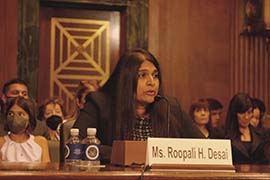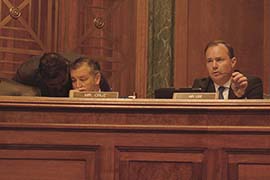- Slug: BC-CNS-Judge Judging,960
- 2 photos available (thumbnails, captions below)
By Morgan Fischer
Cronkite News
WASHINGTON – Republican senators on Wednesday grilled Arizona attorney Roopali Desai, a nominee to the 9th U.S. Circuit Court of Appeals, over her history of working for progressive causes and her work fighting claims of 2020 election fraud.
Many were like Sen. Thom Tillis, R-N.C., who voiced concerns during the Senate Judiciary Committee’s confirmation hearing for Desai about her ability to be an impartial judge after her work in “an area of the law that really requires you to wear a jersey” for one side or the other.
Desai, who would be the first South Asian to serve on the circuit if confirmed, repeatedly told senators that while she has worked as an advocate, as a judge she would be “committed to the rule of law and to implementing the Supreme Court’s precedent.”
“I am committed to following the law objectively and without interjection of any of my personal or political views in any case that is presented before me if I am so fortunate to be confirmed,” Desai told the committee.
While she acknowledged that “some of my clients have been affiliated with Democratic causes,” she has also represented large corporations, Fortune 500 companies and the government.
Desai was nominated by President Joe Biden in June to fill the Arizona seat on the circuit court that is being vacated by Judge Andrew Hurwitz. It’s the seat that was held previously by Judge Mary Schroeder, the first female chief judge in the circuit for whom Desai once clerked.
The 9th Circuit is the largest in the nation, handling appeals from 15 federal districts, ranging from Arizona to Montana, Alaska to Guam, and all the states and territories in between.
The daughter of South Asian immigrants, Desai was born in Toronto but grew up in Glendale and received her undergraduate and law degrees from the University of Arizona. She is currently a partner at Coppersmith Brockelman in Phoenix, which specializes in civil litigation, civil appeals and political law.
She has won several awards for her work as a litigator, and was named one of USA Today’s 12 “Women of the Year” for 2022, alongside gymnast Simone Biles and Vice President Kamala Harris.
In introducing Desai Wednesday, Sen. Kyrsten Sinema, D-Ariz., called her “one of the most experienced and respected lawyers and litigators in the state.” She noted that statements of support have come from groups representing civil rights and human rights law to groups representing police and firefighters.
One letter of support came from Alexander Kolodin, an attorney who opposed Desai in lawsuits challenging the 2020 election results and the state Senate’s much-maligned audit of that election.
“Having faced the very best litigators the other side has to offer, I can tell you with confidence – nobody else holds a candle to Ms. Desai,” wrote Kolodin, who said he had seen her advocated for clients “by making originalist arguments that might have come from Justice (Clarence) Thomas’ pen.”
But Desai’s involvement in the election lawsuits was just one of the issues senators wanted to ask her about Wednesday.
Desai defended Arizona Secretary of State Katie Hobbs in a case brought by voting rights groups that tried to force later registration deadlines during the COVID-19 pandemic. She also represented Hobbs after former President Donald Trump’s campaign sued the secretary of state, the Maricopa County recorder and others, claiming fraud in Maricopa County during the 2020 election. The claims were eventually dropped.
Sen. Ted Cruz, R-Texas, burrowed in on Desai’s brief supporting the Democratic National Committee in Brnovich v. DNC, a case in which the U.S. Supreme Court last year upheld Arizona’s ban on ballot-collection by third parties. Desai’s brief argued that bans on “ballot harvesting” suppress the vote of minority groups, a position Cruz challenged citing a 2005 report by former President Jimmy Carter and former Secretary of State James Bakers that called mail-in ballots “the largest source of potential voter fraud.”
Desai told Cruz only that if confirmed as a judge she would be “committed to the rule of law and to implementing the Supreme Court’s precedent.”
She gave essentially the same answer to Sen. Mike Lee, R-Utah, when he questioned her about her support for a Phoenix law that would have forced a calligraphy and stationery business to produce wedding invitations for same-sex couples. The owners of Brush & Nib Studio claimed that the law violated what Lee called the owners’ “sincerely held religious beliefs.” The Arizona Supreme Court ruled in the company’s favor in 2019.
When pressed by Lee, Desai again said that she “would faithfully and fully apply the precedent of the United States Supreme Court in the 9th Circuit” as a judge.
Republicans seemed more concerned by Desai’s advocacy, which includes service for the American Civil Liberties Union, the National Cannabis Roundtable and Just Communities Arizona, which seeks to end mass incarceration. Cruz noted that she is on the board of Save Our Schools, which advocates against school vouchers – something Cruz supports.
“As an American you have the right to express your First Amendment rights,” Cruz said. “Your job as a judge is different.”
It’s one area where the two agreed: Desai said that the roles of judge and advocate are “starkly different” and she would respect that difference.
Not all the questioning was tough, however. Some of it was not even questioning: Sen. Cory Booker, D-N.J., prefaced his remarks by telling Desai and another nominee that “you can rest, because I just want to talk to you for a few minutes, I don’t have any questions.”
“Ms. Desai, you are this immigrant. You give a testimony to one of the great notes within this symphony of America,” Booker said. “I want you to know I will vote for you, and it will be an enthusiastic vote.”
For more stories from Cronkite News, visit cronkitenews.azpbs.org.
^__=
Web links:
_ Committee hearing: https://www.judiciary.senate.gov/meetings/07/13/2022/nominations
_ Desai nomination: https://www.congress.gov/nomination/117th-congress/2262
_ Desai questionnaire: https://www.judiciary.senate.gov/imo/media/doc/Desai%20SJQ%20Public%20Final.pdf
_ Kolodin letter: https://www.judiciary.senate.gov/imo/media/doc/6.30.22 – Alexander Kolodin Support for Desai.pdf
_ Civil rights letter: https://www.judiciary.senate.gov/imo/media/doc/7.11.22%20-%20AFJ%20Support%20for%20Desai.pdf
_ Human rights letter: https://www.judiciary.senate.gov/imo/media/doc/7.11.22%20-%20LCCHR%20Support%20for%20Desai.pdf
_ Police letter: https://www.judiciary.senate.gov/imo/media/doc/7.5.22%20-%20AZ%20Police%20Association%20Support%20for%20Desai.pdf
_ Firefighters’ letter: https://www.judiciary.senate.gov/imo/media/doc/7.7.22%20-%20International%20Assoc%20of%20Firefighters%20Tenth%20District%20Support%20for%20Desai.pdf
_ Coppersmith Brockelman: https://www.cblawyers.com/
_ Women of the Year: https://www.usatoday.com/storytelling/grid/women-of-the-year-2022/
_ Brnovich v. DNC:https://www.supremecourt.gov/opinions/20pdf/19-1257_g204.pdf
_ Maricopa case: https://cdn.donaldjtrump.com/public-files/press_assets/verified-complaint-with-attachments.pdf
^__=
Roopali Desai, an Arizona attorney nominated for a seat on the 9th U.S. Circuit Court of Appeals, told skeptical senators at her confirmation hearing that her work as an advocate would not influence her decisions as a judge. (Photo by Morgan Fischer/Cronkite News)
Republican Sens. Ted Cruz of Texas, left, and Mike Lee of Utah grilled Arizona attorney Roopali Desai on her previous advocacy during a hearing on her nomination to a seat on the 9th U.S. Circuit Court of Appeals. (Photo by Morgan Fischer/Cronkite News)

